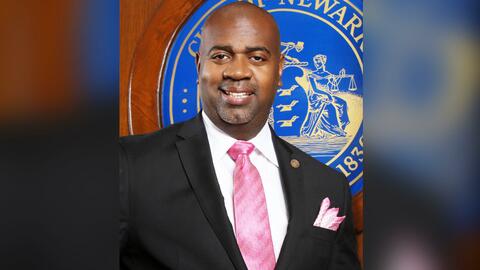Mayor Ras J. Baraka and the New Jersey Urban Mayors Association (NJUMA) announced today that Mayor Baraka has been installed as President and Chair of the Association.
The City of Newark’s 40th Chief Executive, Mayor Baraka is a Newark native with a progressive approach to governing that has won him accolades from grassroots organizations to the White House under President Obama’s administration.
With a forward-thinking agenda that has reduced crime to its lowest levels in five decades, addressed affordability while maintaining steady growth, lowered unemployment, and returned local control of schools after more than two decades, Mayor Baraka has defied expectations since taking office in 2014.
Currently, in his second term, Mayor Baraka is incessantly working to continue the city’s progress, while leading the community through the fight against COVID-19 and keeping the residents first.
“We must ensure that our collective transition from COVID-19 leads to a positive transformation that is laser-focused on unraveling systemic injustice for the residents of our urban centers. I am truly honored to work with my colleagues across the State to advance our cities in such a time as this,” Mayor Baraka, the fifth Mayor to serve as president of the NJUMA since its inception, said.
“Mayor Ras Baraka is a proven leader for the City of Newark and an impassioned advocate for racial and social justice across New Jersey,” Governor Phil Murphy said. “The New Jersey Urban Mayors Association is a critical force in driving transformational social and racial justice policies within our state and I am confident that Mayor Baraka will continue to uplift the voices of our urban communities in his new role as President. I look forward to continuing our work with the New Jersey Urban Mayors Association with Mayor Baraka at the helm.”
Mayor Albert Kelly of Bridgeton, former NJUMA president and chair, said he is confident in Mayor Baraka’s leadership as the new president of NJUMA and looks forward to working closely with him to advance the needs of urban communities.
“As President Emeritus of the NJUMA, I am excited to continue to work with our urban mayors to address issues facing our municipalities," Mayor Kelly said. "It has been a pleasure to pass the leadership reigns to Mayor Baraka as the new president of the NJUMA and I’m sure his leadership, along with the entire executive team, will continue the legacy of the New Jersey Urban Mayors Association making lasting impacts for the betterment of the State of New Jersey."
In addition to Mayor Baraka, new officers include:
- Vice President - Plainfield Mayor Adrian O. Mapp
- Northern NJ Vice-President - Orange Township Mayor Dwayne D. Warren
- Central NJ Vice-President - Trenton Mayor W. Reed Gusciora
- Southern NJ Vice-President - Camden Mayor Francisco “Frank” Moran
- President Emeritus - Bridgeton Mayor Albert B. Kelly
“I’m very excited about bringing the perspective of the Capital City to NJUMA’s Executive Team,” Mayor Gusciora said. “Through NJUMA, Trenton has benefitted greatly from the shared experience of other urban centers on economic development, COVID-19, and public safety. In particular, Mayor Baraka has provided critical insight on the development of new entrepreneurial programs and blight reduction efforts in Trenton, and I look forward to working closely with him on these and other pressing issues in the future.”
The John S. Watson Institute for Public Policy of Thomas Edison State University, which has been providing policy analysis and applied research for urban municipalities and NJUMA since 1991, will work with Mayor Baraka to continue its work to chart new paths for New Jersey’s urban communities.
The New Jersey Urban Mayors Association is dedicated to working with state and federal lawmakers and officials to develop appropriate and effective public policy measures that benefit the state’s urban centers and to help lawmakers understand how public policy affects New Jersey’s cities and municipalities.
